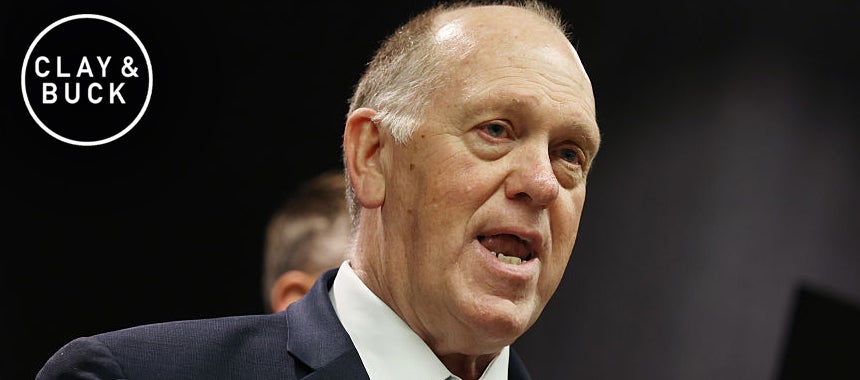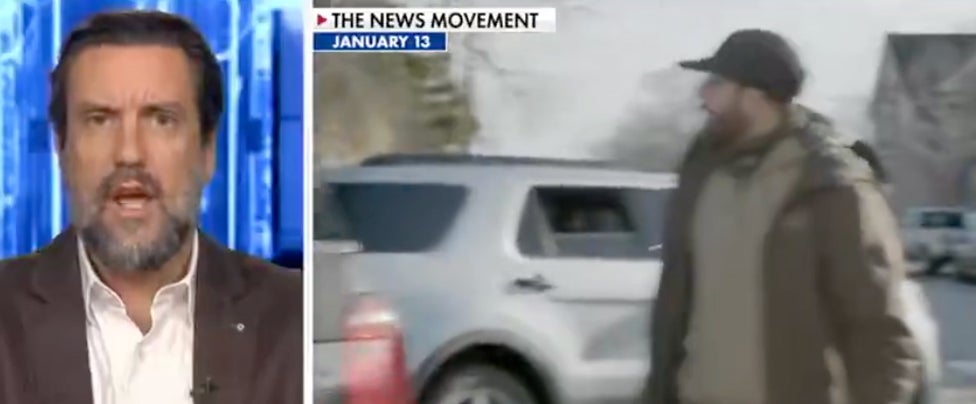Andy McCarthy Analyzes the Sussmann Trial Revelations
25 May 2022
BUCK: We’re gonna dig deep, go to bottom, the origins of the Russia collusion lie. We’re not gonna let it just go away because the left doesn’t want to talk about it anymore, after three years of obsessing over it, and we got the Sussmann trial underway right now.
Our friend Andy McCarthy joins. He’s at National Review, a Fox News contributor, spent over 20 years as an assistant U.S. attorney for the Southern District of New York. Andy, great to have you back.
MCCARTHY: Hey, guys, how are you? Good to be with you.
BUCK: Good, Andy. So what is the biggest revelation, take away for you so far in the Sussmann trial? Obviously the Robby Mook testimony about Hillary giving the order when it comes to the Russia collusion investigation and pushing that forward to the FBI seems like a big deal, but what are your biggest take-aways?
MCCARTHY: Well, my biggest concern going into the trial, Buck, was that Durham has really planted his leg here on something that I think is a dubious proposition. In federal law, if it was a crime to make a false statement, he’d be fine. The problem is the crime is making a false statement to the FBI.
And Durham has basically — his theory of his case is that the FBI was duped here, and I think those of us who watched this closely for a long time think it’s more complicated than that, to say the least.
 And I was afraid that the FBI would give Sussmann a lot of his defense in this case, and I think that has turned out to be true. So while it should be a slam-dunk case because the lie that’s charged is that he claimed he wasn’t representing anyone when in fact he was representing the Clinton campaign, that seems to be clear, and you have prove materiality.
And I was afraid that the FBI would give Sussmann a lot of his defense in this case, and I think that has turned out to be true. So while it should be a slam-dunk case because the lie that’s charged is that he claimed he wasn’t representing anyone when in fact he was representing the Clinton campaign, that seems to be clear, and you have prove materiality.
It should be easy to prove materiality because obviously the reason he lied was because if he had said, “I’m here from the Clinton campaign bringing you some opposition research about the opposition candidate who we’re running against in six weeks,” you know, they would have looked at the information very differently. The whole reason for the lie is obvious.
So they should be able to prove this. The problem is it’s come out in the last couple of days that, you know, the FBI claimed in their paperwork opening the case that the information hadn’t come from Sussmann, but it came from the Justice Department, which is not true.
So if you’re prosecuting a statement of false statements to the FBI and the FBI itself has made a false statement in its investigation opening document, that’s not a great way to kick it off.
And it just seems to me that the reason that they concealed his identity, that is Sussmann’s identity, you know, they say they wanted to treat him like a confidential informant. There was to reason to treat him like a confident informant. He wasn’t under any threat. They treated him like a confidential informant which allowed them to conceal his identity from the agents who were doing the investigation because they knew they were taking explosive political information from a political source and they didn’t want to get caught doing it.
So they knew they were playing with fire, and it just goes to show that, you know, the FBI’s position here is not the usual position we expected to find the FBI in.
CLAY: Okay, Andy, he gets convicted, he doesn’t get convicted. What does it mean going forward? Because at a minimum we now have an under-oath testimony from Hillary Clinton’s campaign manager that she was directly involved, at least in knowledge, about the fact that they were sharing this information.
If he is found not guilty, if he is found guilty, what does it mean going forward, in your mind, as to this overall and overarching investigation?
MCCARTHY: The thing is, Clay, I think you’re asking me what’s sensible as a legal question. And it makes perfect sense. But I think the question is really more political than legal.
 Just in a very blunt, bottom-line sense, I think if Sussmann gets acquitted, the media is just gonna kill Durham’s investigation. And we may be able to analyze it logically and legally and say, you know, look, the evidence here showed that Sussmann lied and it showed even more that the FBI acted in a very curious way throughout this investigation and clearly was in the tank to this whole idea that Trump was in a corrupt relationship with Russia, which guided a lot of this activity, not just in this case but also in the broader investigation.
Just in a very blunt, bottom-line sense, I think if Sussmann gets acquitted, the media is just gonna kill Durham’s investigation. And we may be able to analyze it logically and legally and say, you know, look, the evidence here showed that Sussmann lied and it showed even more that the FBI acted in a very curious way throughout this investigation and clearly was in the tank to this whole idea that Trump was in a corrupt relationship with Russia, which guided a lot of this activity, not just in this case but also in the broader investigation.
So, you know, I think we can look at this and still take things away from it that are very valuable in terms of the historical record inspect but in terms of the impact of Durham’s investigation, which, you know, by the way, it’s not exactly capturing the imagination of the country, right? I mean, it’s not like people are paying rapt attention to this.
But I think the media is just gonna — if Sussmann walks then the media is just gonna say, Durham has wasted everyone’s time for three years.
BUCK: I mean, it’s amazing, isn’t it? After Mueller really wasted everybody’s time for as long as he did, the narrative could turn into, well, Durham, you know, it’s just stunning. Speaking to Andy McCarthy, everybody, National Review, Fox News, former assistant U.S. attorney for, Andy, what, 23 years? Is that right? You were there awhile.
MCCARTHY: About 20.
BUCK: About 20. Okay. So, Andy, on the Durham report, there’s supposed to be a report, right? Isn’t that how this is eventually going to be finished up? Is that something that you expect is gonna come out this year?
Basically is this gonna amount to anything? You know, ’cause a lot of people are promised a lot of things for a long time about getting — everything we said about Russia collusion, it was a Hillary plot, the FBI went with it, fell for it, whatever, the deep state pushed it, the media amplified it and were colluding in it, does the Durham thing go anywhere? ‘Cause it sounds to me like you’re worried, not really.
MCCARTHY: Well, I mean, I think you get a final report at the end. Whether that will be this year or not — I hope it’s this year but, you know, Durham’s made some sounds the last three weeks like he’s not done yet, that there may be more charges. Now, maybe there will be. Maybe there won’t be but I caution people who get excited whenever he says such things is twofold.
Number one, the statute of limitations for most federal crimes is five years. And most of what went on here happened in 2016-2017. So, you know, time’s a-wasting if you’re gonna indict something within the statute of limitations.
And then the second thing gonna sound like I’m beating a dead horse, but I’m gonna repeat what I said at the beginning, if you want the big fraud on the government case here, the only way you make that is if the FBI is in on it. And Durham’s theory seems to be that the FBI was duped, which is proving to be a big problem for him, I think, in the Sussmann case as it is.
So I wouldn’t expect a big indictment on a theory that the government agencies were defrauded here by the Clinton campaign, but he is supposed to write a narrative report.
I think the reason that Bill Barr made him a special counsel rather than just an ordinary prosecutor is that ordinary prosecutors, like, when I was at the Southern District in New York, if I didn’t have enough evidence to make a case I closed the file and moved on to the next case. Special counsel have to write a final report, it’s supposed to be a confidential report that you write to the attorney general summarizing the investigation and explaining your charging decisions. Customarily, most of these have become public like the Mueller investigation did in — you know, substantially public. There’s a lot of stuff you have to withhold like grand jury information or classified information, but for the most part you get the story.
 The thing is I don’t know, guys, if the media is gonna agitate for the Durham report the same way they agitated for the Mueller report, particularly if there’s acquittals along the way. I just wonder how hard people are gonna fight over it.
The thing is I don’t know, guys, if the media is gonna agitate for the Durham report the same way they agitated for the Mueller report, particularly if there’s acquittals along the way. I just wonder how hard people are gonna fight over it.
CLAY: Andy, sitting here as a lawyer, I always like to analyze what is the jury potentially gonna look like, what might their preconceptions be, what time their internal biases be. This is obviously a huge part of any jury selection.
And of all places to have a trial, forum shopping-wise for Hillary Clinton, you may be able to name a better one. I can’t really think of one better than Washington, D.C., which is an overwhelmingly Democrat city.
In addition to the challenges you’re mentioning that Sussmann conviction may entail for Durham, how would you analyze the people who are making the decision here, and how much does that factor in in terms of guilt or innocence?
MCCARTHY: Yeah, I think you’re really hitting on the main thing, you know. I’ve said a number of times that Durham may represent the government, but this is not a home game for the government, this trial.
And I think it’s even worse in some ways because the judge has a lot of ties to Clinton world. He’s an Obama appointee, just so people understand what I mean when I say he’s got ties to the Clinton world, when he got out of law school he clerked for a pretty famous judge on the DC Circuit named Abner Mikva. And the year his courtship ended, Mikva went to the Clinton White House to become the White House counsel to Bill Clinton and Cooper, the judge, went to the Justice Department to work for Amy Gorelick, who was the deputy attorney general in the Justice Department.
So his Clinton ties go back a long way, and there are a lot of suggestions that he shouldn’t be sitting on this case ’cause he might be too conflicted. He doesn’t think he was. And I think his looseness in terms of analyzing conflict of interest spread over into the picking of the jury.
 So he seemed to think that as long as he told the jurors that Donald Trump is not on trial here and Hillary Clinton is not on trial, that somehow talismanically, magically removed the political overtones from the case, which of course it doesn’t. If it wasn’t for Clinton and Trump there wouldn’t be any case.
So he seemed to think that as long as he told the jurors that Donald Trump is not on trial here and Hillary Clinton is not on trial, that somehow talismanically, magically removed the political overtones from the case, which of course it doesn’t. If it wasn’t for Clinton and Trump there wouldn’t be any case.
But nevertheless that was his approach we have people on the jury who basically said during the selection process that they contribute to Democrats, that they supported Clinton, that they oppose Trump, and we have one juror who disclosed in the middle of the trial — and I think she did this in good faith. I don’t mean to suggest otherwise. But she came in one day and she said, “Oh, I just found out that my daughter is on the same sports school team as Sussmann’s daughter,” I think they were on a crew team together.
CLAY: D.C. is a small town, by the way, for people out there who are like that’s crazy. It’s really not a big population.
MCCARTHY: Nope.
BUCK: Andy, before he’s let you go, can I just ask you — obviously the biggest thing on everyone’s minds across the country now is this horrific shooting that occurred in Uvalde.
You were a federal prosecutor as we said for over 20 years. You put away mob hit men, terrorists; you prosecuted the first World Trade Center bombing bombers.
Is there anything that you think, you know, from a legal perspective, either in the tool kit of the legislature or as just prosecutors from a legal perspective, is there something that could be done to try to stop these kinds of mass murdering psychopaths before they can engage in. I just wanted to pose that to you. I mean, you’re a true expert. You’re a guy who’s really been there and been on the front lines, stared down evil. What could we do?
MCCARTHY: Well, Buck, you know, no constitutional right is absolute, right? Even liberty can be removed as long as you accord due process of law. You have to prove things beyond a reasonable doubt to remove someone’s liberty.
So in my own mind, I could concoct like a red flag type system that would have enough due-process rights that we could have confidence in it that you might be able to remove guns from people if you could make a showing that they were, you know, mentally disturbed in some way or, you know, we could hash out the grounds for it.
The problem is even if I could come up with something perfect legally, I don’t think the Democrats can be trusted politically not to use these processes punitively, because every place we turn, they’re using — like, they’re weaponizing the Justice Department.
 So, if you’re a numskull and you’re wandering around the Capitol, you’re not doing anything violent, but you’re in a place where you shouldn’t be, they’re haul you back 2,000 miles from New Mexico and make you stand in a misdemeanor trial. But if you’re camped outside a Supreme Court justice’s lawn, you know, on their property, protesting for abortion rights, they say, “Oh, well, as long as they’re being peaceful, it doesn’t make any difference.”
So, if you’re a numskull and you’re wandering around the Capitol, you’re not doing anything violent, but you’re in a place where you shouldn’t be, they’re haul you back 2,000 miles from New Mexico and make you stand in a misdemeanor trial. But if you’re camped outside a Supreme Court justice’s lawn, you know, on their property, protesting for abortion rights, they say, “Oh, well, as long as they’re being peaceful, it doesn’t make any difference.”
So they’re so political the way this they use the processes that we give them, I have a hard time in good conscience saying, well, why don’t we come up with a new legal system that can be used to remove guns from people when I don’t have confidence it’ll just be used in good faith.
BUCK: Clay and I totally agree, by the way.
CLAY: We’re just nodding our heads. That is so well said, I think. Indeed. Andy McCarthy, we appreciate it. We know how busy you are. That’s been a fantastic analysis of all this.
MCCARTHY: Thanks so much, guys. Have a great week.
CLAY: We will for sure.
Recent Stories
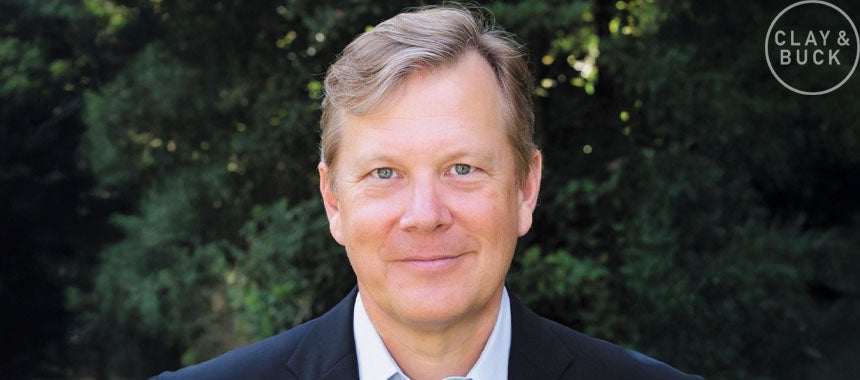
Peter Schweizer: Democrats Colluded with Foreign Powers to Use Immigration as a Weapon
The bestselling author has a new #1 book: The Invisible Coup: How American Elites and Foreign Powers Use Immigration as a Weapon.
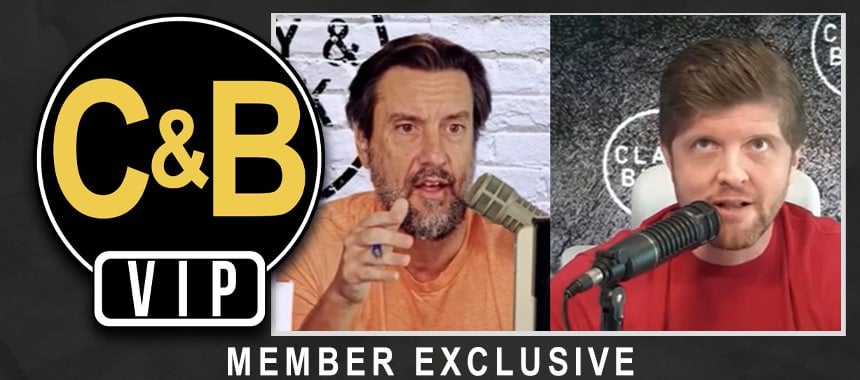
VIP Video: Echoes of the Duke Lacrosse Tragedy
C&B reach back in time for a lesson that still applies.
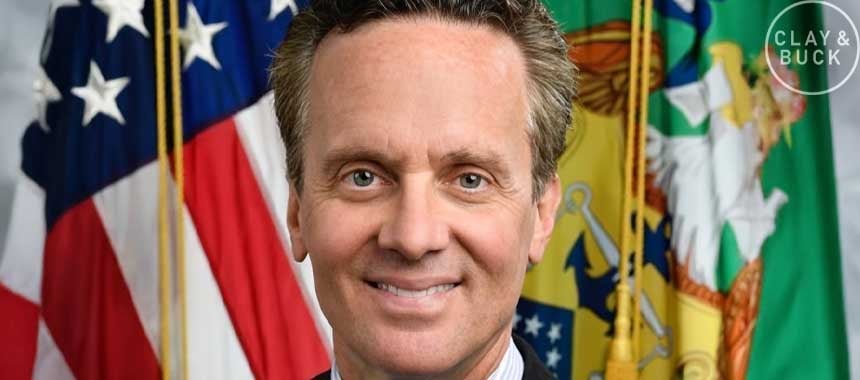
Joe Lavorgna, Counselor to Scott Bessent, Explains Why Trump Accounts Are a Game Changer
The highly respected economist and U.S. Treasury official on the soaring Trump economy.




